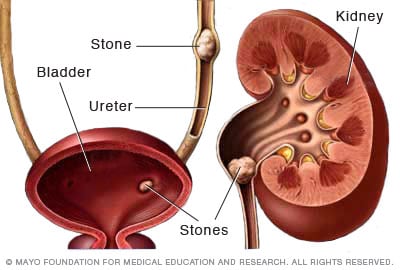Kidney Stones vs UTI: Recognizing the Overlapping Symptoms and Treatment Techniques
Wiki Article
Exploring the Effects and Causes of Kidney Stones in Contrast to Urinary System Tract Infections: An In-depth Overview
The exploration of kidney stones and urinary system infections (UTIs) exposes an intricate interaction of symptoms and underlying causes that require mindful examination. While both conditions can result in hematuria, they provide unique professional features and develop from various etiological variables. Comprehending the subtleties of each problem is crucial for effective diagnosis and management. What are the key distinctions in their signs and symptoms, and how might these educate therapy approaches? The response to these concerns might offer vital understandings right into the avoidance and treatment of these typical urological issues.Introduction of Kidney Stones
Kidney rocks, likewise called kidney calculi, type when certain materials in the urine crystallize and accumulation, bring about the advancement of hard down payments within the kidneys. These stones can differ in size, varying from a grain of sand to a golf ball, and can be made up of different products, the most usual being calcium oxalate, uric acid, struvite, and cystine. The formation of kidney rocks is influenced by numerous aspects, including nutritional habits, liquid consumption, and genetic proneness.Symptoms of kidney rocks may consist of extreme pain in the back or side, blood in the pee, nausea or vomiting, and constant peeing, particularly as the rock relocates with the urinary system system. Diagnosis generally includes imaging studies such as ultrasound or CT scans, together with urinalysis to recognize the stone's structure.
Therapy options vary based upon the dimension and sort of rock, along with the seriousness of signs and symptoms (Kidney Stones vs UTI). Tiny stones may pass normally with raised fluid intake, while larger stones might call for clinical interventions such as lithotripsy or surgical removal. Comprehending the pathophysiology and threat factors related to kidney stones is necessary for effective prevention and management
Summary of Urinary System System Infections
Urinary system system infections (UTIs) are typical bacterial infections that affect any kind of component of the urinary system, including the kidneys, ureters, bladder, and urethra. They predominantly occur when microorganisms, usually from the stomach tract, enter the urinary system, leading to swelling and infection.The occurrence of UTIs is notably greater in females than males, mostly due to physiological differences, such as a shorter urethra. Threat elements include sex, certain contraceptive methods, urinary system retention, and dehydration. The diagnosis of UTIs is generally validated through pee tests, which might expose the visibility of germs, white blood cells, or red cell.

Signs And Symptoms of Kidney Stones
The discomfort related to kidney rocks can show up in numerous ways, typically leading people to look for medical attention. One of the most typical symptoms is extreme discomfort, typically localized in the lower back or side, which may radiate to the abdomen or groin. This pain, typically referred to as sharp or cramping, can take place instantly and might fluctuate in intensity.Additionally, individuals might experience hematuria, or blood in the urine, which can range from microscopic go to my blog amounts to visible staining. This symptom might be come with by adjustments in urinary system behaviors, such as increased regularity or necessity, along with pain during urination. Nausea and throwing up are additionally common, commonly arising from the body's response to intense pain.
In many cases, individuals might experience high temperature and chills, specifically if an additional infection establishes as a result of the obstruction triggered by the stones. Generally, the combination of serious discomfort, hematuria, altered urinary system patterns, and gastrointestinal signs can give considerable understanding into the existence of kidney rocks, requiring timely clinical assessment and treatment. Recognizing these symptoms is important for timely diagnosis and efficient monitoring of the condition.
Symptoms of Urinary System Infections
Infections within the urinary system system frequently provide an array of distinct symptoms that can substantially influence every day life. The most typical signs include a consistent impulse to pee, usually accompanied by a burning sensation during urination, understood as dysuria. People might likewise experience boosted regularity of peeing, creating percentages of urine each time.Other noteworthy signs and symptoms consist of cloudy or foul-smelling pee, which might suggest the existence of germs or pus. In many cases, urine may appear pink or red as a result of the visibility of blood, a problem understood as hematuria. Furthermore, individuals might experience pelvic pain or pressure, which can even more intensify the feeling of urgency.
Systemic symptoms might likewise materialize, such as fever, cools, and tiredness, particularly if the infection has risen to the kidneys. It is necessary to acknowledge these signs early, as neglected urinary tract infections can bring about a lot more severe difficulties. Kidney Stones vs UTI. Trigger medical focus is recommended when these symptoms are observed, permitting for suitable analysis evaluation and therapy to minimize pain and stop further health and wellness issues
Root Causes Of Each Condition
Regularly, kidney stones and urinary system tract infections arise from distinctive yet in some cases overlapping reasons that can affect people differently. Kidney rocks generally create due to metabolic variables, dietary options, and hereditary predispositions. Boosted degrees of calcium, oxalate, or uric acid in the urine can result in rock development. Dehydration, not enough fluid intake, and high-sodium diet regimens can intensify these problems, advertising crystallization within the urinary system.
Comprehending these distinct reasons is vital for prevention and therapy. Kidney Stones vs UTI. While way of life modifications might reduce the threat of kidney stones, appropriate health and prompt therapy of urinary system infections are important for reducing their their website reoccurrence and associated issues
Conclusion
In recap, kidney stones and urinary system system infections present distinct signs and symptoms next page and underlying causes. Kidney rocks are identified by serious discomfort and metabolic factors, while urinary system system infections mainly include microbial infections resulting in urinary system seriousness and pain. Although both conditions can lead to hematuria, their development mechanisms differ dramatically. Comprehending these distinctions is crucial for efficient medical diagnosis and treatment, eventually boosting person outcomes for those impacted by either condition.The exploration of kidney stones and urinary system infections (UTIs) discloses an intricate interaction of signs and symptoms and underlying reasons that necessitate mindful exam.Urinary system system infections (UTIs) are typical microbial infections that impact any type of part of the urinary system, including the kidneys, ureters, bladder, and urethra.Often, kidney stones and urinary tract infections arise from distinctive yet sometimes overlapping reasons that can impact people in a different way.In summary, kidney stones and urinary system system infections present unique signs and underlying causes. Kidney rocks are identified by serious pain and metabolic elements, while urinary system infections mostly include bacterial infections leading to urinary system necessity and pain.
Report this wiki page